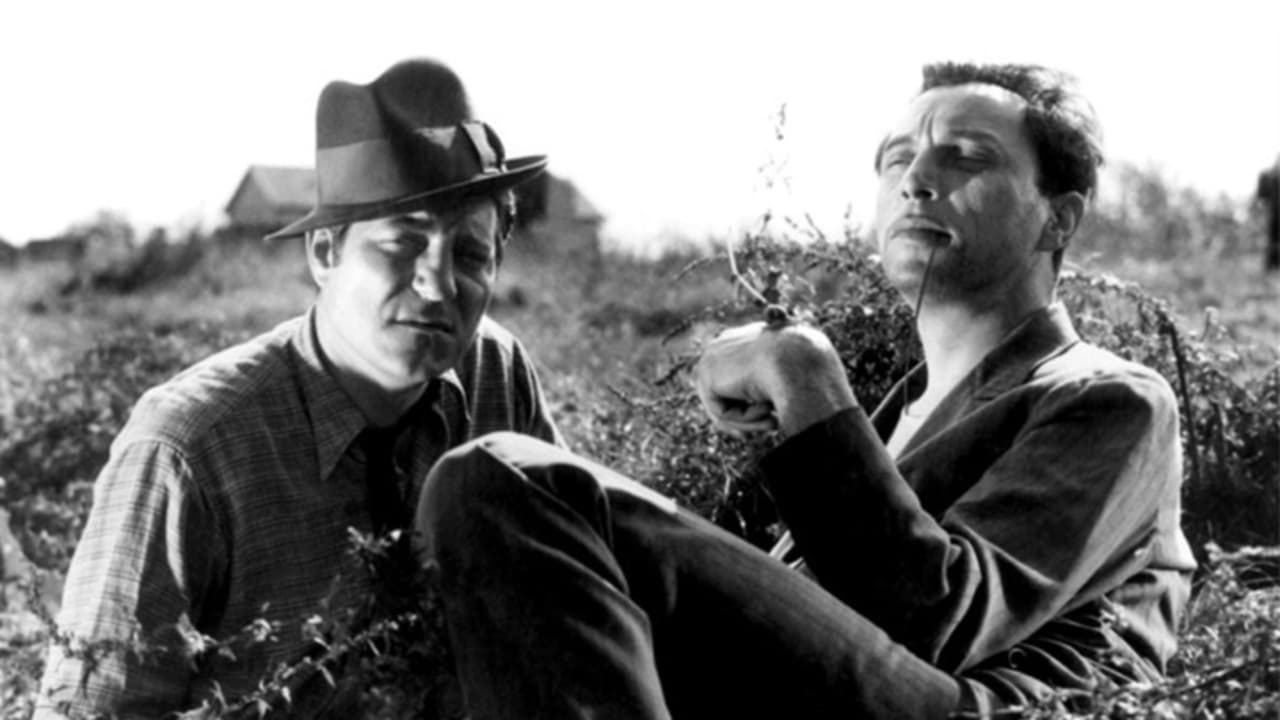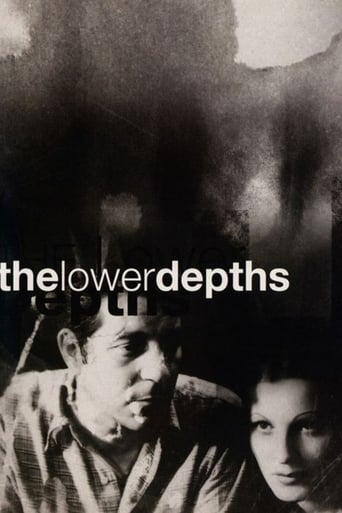

This was the first of three collaborations between Jean Gabin and Jean Renoir in the mid-late thirties and there is a distinct link between this and Le Grande Illusion in the friendship across the classes as epitomised in both films by Gabin's prole and respectively Louis Jouvet's and Pierre Fresnay's aristocrat. Gabin was a star in all but name by 1936 when this was shot and it came more or less in the centre of his great fertile first period surrounded by La Bandera, La Belle Equipe, Pepe Le Moko, Quai des Brumes, Le Bete Humaine etc. Louis Jouvet was first and foremost a man of the theatre but he made several successful forays into film and also had a masterpiece (Feyder's La Kermesse heroique) behind him when he made this. Not unnaturally he and Gabin walk away with the piece despite a 'flashy' turn by Robert Le Vigan and solid support by Suzy Prim. Despite Russian names none of the principals is convincing as a Russian - and to be fair they don't try all that hard - but they do, nevertheless, weigh in with some top of the line acting and though the 'happy' ending clashes with Gorky's original it remains a fine movie.
... View MoreHaving seen Akira Kurosawa's 1957 version of the Maxim Gorky play prior to Jean Renoir's 1936 adaptation, I must admit that they couldn't be more different despite being rooted in the same material. Certainly the characters and situations are similar but the tone utilized by each of these world-class directors is so vast in comparison it bears mentioning. While Kurosawa insisted on focusing on these people's problems and their desperation to escape the futility of their world by remaining within the impoverished setting for the entire film, Renoir takes a lighter side by exploring the outside world, showing various methods of escape these characters dream of.As with Kurosawa, the main focus of Renoir is the love triangle between the thief (played here remarkably by the subtle Jean Gabin) and two sisters, the elder shrill one being the landlord's wife and the other being rather sweet, gentle and somewhat innocent. To me, Renoir plays it better although it is certainly possible that Kurosawa meant specifically to showcase the love triangle as bleak as possible. As for Renoir, he gives all the characters something to say or reminisce about, usually love and death, life and happiness. The rhythm of the dialogue is so melodic and harmonious, it is one of the easiest listening experiences of any foreign film. The conversations between characters is brief but full of meaning, making for a terrific audience experience.In short, both Renoir and Kurosawa's versions should be viewed although for different reasons. To see Kurosawa's is to see a master director able to balance several characters and story-lines all while maintaining the tone and decorum of futile loneliness. Renoir does the same, only with that particular French joie de vivre. Whatever is to your liking, rest assured each of these films will deliver.
... View MoreJean Renoir's The Lower Depths is centered around a contrast in personalities. Jean Gabin, the great proletarian star, plays Pepel, a petty thief who remains jovial despite his restless desire to escape his deprived circumstances. While on a robbery job, Pepel meets The Baron, a disgraced nobleman, and the two strike up a friendship. These two men could not be more diametrically opposed, both in their social circumstances and their bearing. Pepel carries himself with the casual ease of a man who knows who he is, who's possessed of a basic trust in himself. The Baron, on the other hand, moves like he's perpetually running to the bathroom, his bowels - and his entire soul - afflicted with a painful case of tightness. The contrast between these two personalities, one open to life and the other closed off, is made all the more explicit by the differing acting styles of the two performers. No one was ever more natural than Gabin, with his understated charm and leonine presence. On the other side of the acting spectrum lies the extreme stylization of Louis Jouvet, who plays The Baron as a shambling collection of strained mannerisms. There's something elementally interesting about watching this clash of styles, this meeting of the naturalistic and the bizarrely theatrical. By some weird act of alchemy the two personalities, rendered in wildly different ways, mingle so pleasingly that we could scarcely ask for more.Jean Renoir has made a highly-detailed, richly-textured humanist film out of Gorky's play. The story follows the various denizens of a lower-class boarding house lorded over by the slimy Kostylev, who's married to the jealous Vassilissa, who loves the restless Pepel, who's in love with Vassilissa's abused sister Natacha. The Baron, after losing his luxurious apartments over a money scandal, moves into the boarding-house, and alone among its inhabitants discovers bliss amidst the squalor. This might seem like a rather too glaringly pro-Socialist turn-of-events, the nobleman who becomes happy when he's brought low, but it works because Louis Jouvet is so subtly funny in the way he portrays The Baron's transformation. He makes The Baron seem a little bit teched, which helps to smooth out the character's ascent from suicidal desperation to grass-dozing, snail-fondling contentment. The acting overall is marvelous: Vladimir Sokoloff plays the old landlord Kostylev as a Dickensian creep; Suzy Prim brings a bitchy edge to the ambitious Vassilissa; and Junie Astor plays Natacha with a Cinderella-like down-trodden radiance. These characters find themselves embroiled in a scenario that's a bit more straight-forwardly melodramatic than in some of Renoir's other '30s films, but the plot barely matters what with all the physical detail and accomplished emoting - all orchestrated with a master's touch by Renoir, who tinges everything with a slightly sour irony. The staging is strikingly assured from start to finish, the camera-work possessed of an under-stated expressiveness that is purely Renoir. If the film falters anywhere compared to Renoir's other work it's in the slight sense of conventional melodramatic emphasis that creeps into some of the later scenes. The storytelling is sometimes casual and organic as in Renoir's masterpieces Grand Illusion and Rules of the Game, but there are other times when the plot-mechanics show through. Renoir normally smooths over these rough-spots, but in The Lower Depths he seems to have left them in, perhaps intentionally - perhaps meaning to give the film a certain conventional sense of climax. At any rate this hardly matters - the film is so richly textured and rhythmically satisfying that we can forgive Renoir for indulging in a few theatrical flourishes. This is one of the unquestioned classics of French poetic-realism.
... View MoreNow that Criterion has released not one but two 'Lower Depth' features, one by Renoir, the other by Kurosawa, you have a double bill of masterpieces to look forward to. Renoir's contribution to this menage is a surprisingly buoyant one. Gabin and Jouvet dominate the film with their mano-a-mano discussions on life and freedom. Suzy Prim is properly bitchy as the woman scorned, although Junie Astor as her oppressed sister doesn't have it in her to elevate the scenes that she's in. The plot is almost completely different from Gorky's, yet the playwright read and publicly approved of the project. In Renoir's world there is always a way out for those who are kind and strive. There are doomed souls too, but their fates are laid out in a gentle, loving manner. This isn't the best Renoir film, but it reflects his lifelong humanism and warmth (and many depth-of-field shots for those mise-en-scene fanatics). Needless to day, I enjoyed it thoroughly.
... View More